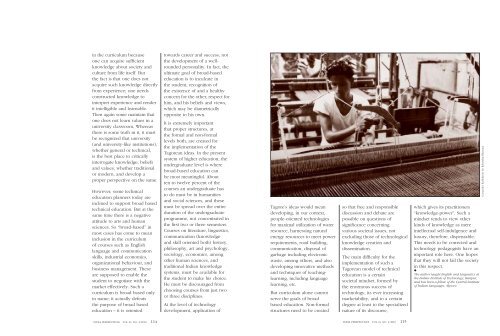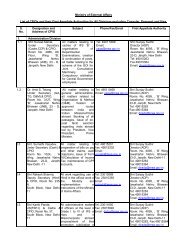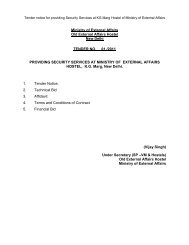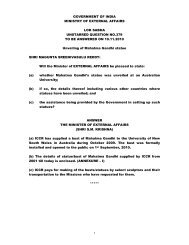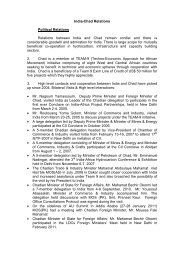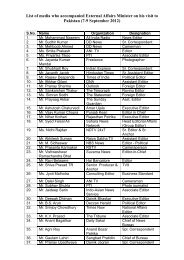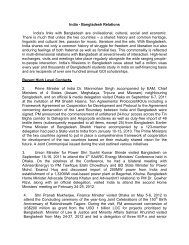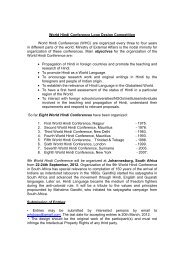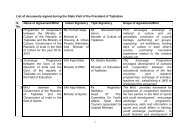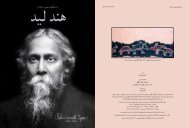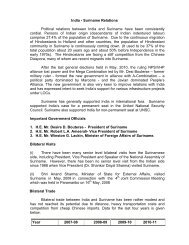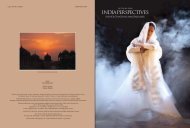IP_ Tagore Issue - Final.indd - high commission of india mauritius
IP_ Tagore Issue - Final.indd - high commission of india mauritius
IP_ Tagore Issue - Final.indd - high commission of india mauritius
Create successful ePaper yourself
Turn your PDF publications into a flip-book with our unique Google optimized e-Paper software.
in the curriculum becauseone can acquire sufficientknowledge about society andculture from life itself. Butthe fact is that one does notacquire such knowledge directlyfrom experience; one needsconstructed knowledge tointerpret experience and renderit intelligible and learnable.Then again some maintain thatone does not learn values in auniversity classroom. Whereasthere is some truth in it, it mustbe recognized that university(and university-like institutions),whether general or technical,is the best place to criticallyinterrogate knowledge, beliefsand values, whether traditionalor modern, and develop aproper perspective on the same.However, some technicaleducation planners today areinclined to support broad basedtechnical education. But at thesame time there is a negativeattitude to arts and humansciences. So “broad-based” inmost cases has come to meaninclusion in the curriculum<strong>of</strong> courses such as Englishlanguage and communicationskills, industrial economics,organizational behaviour, andbusiness management. Theseare supposed to enable thestudent to negotiate with themarket effectively. Such acurriculum is broad based onlyin name; it actually defeatsthe purpose <strong>of</strong> broad basededucation – it is orientedtowards career and success, notthe development <strong>of</strong> a wellroundedpersonality. In fact, theultimate goal <strong>of</strong> broad-basededucation is to inculcate inthe student, recognition <strong>of</strong>the existence <strong>of</strong> and a healthyconcern for the other, respect forhim, and his beliefs and views,which may be diametricallyopposite to his own.It is extremely importantthat proper structures, atthe formal and non-formallevels both, are created forthe implementation <strong>of</strong> the<strong>Tagore</strong>an ideas. In the presentsystem <strong>of</strong> <strong>high</strong>er education, theundergraduate level is wherebroad-based education canbe most meaningful. Aboutten to twelve percent <strong>of</strong> thecourses an undergraduate hasto do must be in humanitiesand social sciences, and thesemust be spread over the entireduration <strong>of</strong> the undergraduateprogramme, not concentrated inthe first two or three semesters.Courses on literature, linguistics,communication (knowledgeand skill oriented both) history,philosophy, art and psychology,sociology, economics, amongother human sciences, andtraditional Indian knowledgesystems, must be available forthe student to make his choice.He must be discouraged fromchoosing courses from just twoor three disciplines.At the level <strong>of</strong> technologydevelopment, application <strong>of</strong><strong>Tagore</strong>’s ideas would meandeveloping, in our context,people-oriented technologiesfor maximal utilization <strong>of</strong> waterresource, harnessing naturalenergy resources to meet powerrequirements, road building,communication, disposal <strong>of</strong>garbage including electronicwaste, among others, and alsodeveloping innovative methodsand techniques <strong>of</strong> teachinglearning,including languagelearning, etc.But curriculum alone cannotserve the goals <strong>of</strong> broadbased education. Non-formalstructures need to be createdso that free and responsiblediscussion and debate arepossible on questions <strong>of</strong>significance concerningvarious societal issues, notexcluding those <strong>of</strong> technologicalknowledge creation anddissemination.The main difficulty for theimplementation <strong>of</strong> such a<strong>Tagore</strong>an model <strong>of</strong> technicaleducation is a certainsocietal mindset, formed bythe enormous success <strong>of</strong>technology, its ever increasingmarketability, and to a certaindegree at least to the specializednature <strong>of</strong> its discourse,which gives its practitioners“knowledge-power”. Such amindset tends to view otherkinds <strong>of</strong> knowledge as mereintellectual self-indulgence andluxury, therefore, dispensable.This needs to be corrected andtechnology pedagogists have animportant role here. One hopesthat they will not fail the societyin this respect.◆The author taught English and Linguistics atthe Indian Institute <strong>of</strong> Technology, Kanpur,and has been a fellow <strong>of</strong> the Central Institute<strong>of</strong> Indian Languages, Mysore.Gavandes Kollektion im Rabindra-BhavanaINDIA PERSPECTIVES VOL 24 NO. 2/2010 114 INDIA PERSPECTIVES VOL 24 NO. 2/2010 115


